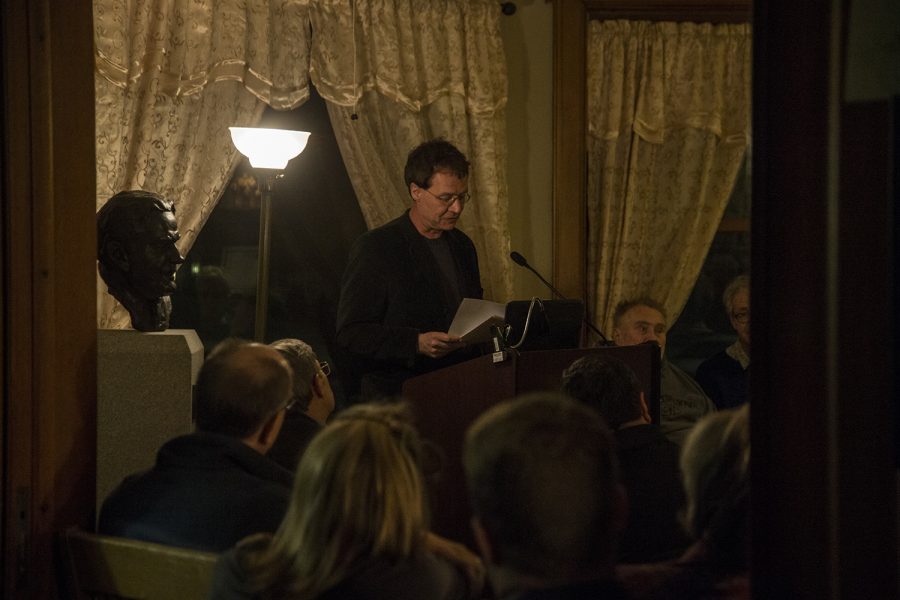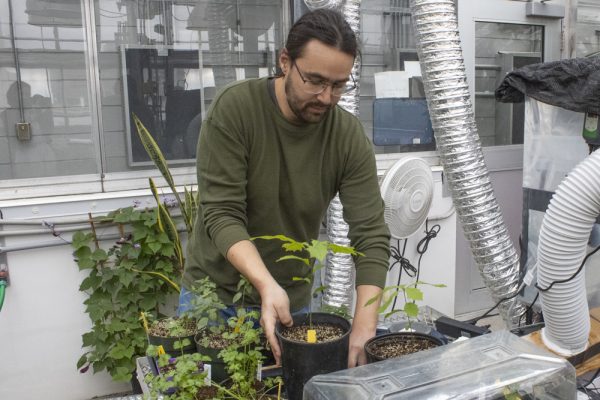Three different languages, one poet’s powerful voice
Chuck Miller, whose collector of poetry Harvesters has been recently published in a combined English, French, and German edition, visited Shambaugh House Tuesday evening. He has experienced poverty throughout his life, and hopes his writing will spark change in the new generation.
March 6, 2019
“My poems are about the absurdity of life. It’s constantly breaking down and not making sense.”
Chuck Miller said this as he shared the story of his life, and the hardships he’s endured, on Tuesday night at the Shambaugh House. At the event, excerpts from Miller’s collection of poetry, Harvesters, were read in English, German, and French. Miller’s poetry largely explores his experience as a migrant laborer in the U.S.
RELATED: Beckoning voids, answering poetry
“In the summers, when I didn’t have any work at all, I became a migrant laborer,” Miller said. “This book is more or less about being a migrant laborer. I worked with the poorest people then, at work sites wherever there was migrant labor to do. [I didn’t work] as a supervisor or anything, but as a worker.”
Miller has graduated from numerous universities, including earning a degree from the Iowa Writers’ Workshop. Because he wasn’t wealthy, he said, it wasn’t easy for him to get in.
“I left home and went to school, and I couldn’t get any work to speak of anywhere, so I [decided to go] back to school and tried this school and that school and didn’t get in anywhere,” Miller said. “But finally I got here and got in the Iowa Writers’ Workshop. This was the first real break I had, and I think that the director was just a good guy, so he just let me in. Most of the people he let in were from the elite school, but I was a lower-class student who had been poor all my life. Maybe he had some sympathy for me, but he let me in.”
After graduating from the Workshop, Miller bounced around from job to job and taught all over the world, including in Ukraine, Argentina, Siberia, and Czechia. It was his international experiences coupled with a clear American-poetic style that drew the interest of French translator Vincent Dussol and German translator Walter Grünzweig.
“He’s a really outstanding American poet,” Grünzweig said. “There’s a lot of American poetry, but he is steadfast — his poetic voice expresses that. His strong opinions and his attempts to show people who are disadvantaged, not only in this country but in this world, give a voice to such people and do so without any sentimentality, rather in a tough sort of way. [It’s] very interesting.”
Dussol and Grünzweig partnered with Miller to release *Harvesters*, published by two separate publishers in both France and Germany, a feat unique in the book-selling industry. In this sense, there are three different voices to Miller’s poetry, three lenses through which his works are viewed.
While the majority of American readers are likely to only understand the English portions, Harvesters is still an invaluable read, because it is an inside view to a perspective that is unexperienced or ignored by the upper and middle classes.
“What I love about Chuck’s voice is that it’s very much so of the ‘Walt Whitman’ variety,” said Professor Ed Folsom, who read the English portions of Miller’s poetry at the event. “It gains this sort of identity with the people he’s writing about rather than looking at them as ‘the others.’ His voice is one of them; he’s far from a voice of privilege, he’s speaking of someone who understands the importance of getting by on a little bit. He speaks eloquently as one of the dispossessed people rather than one of the possessed looking at the dispossessed.”
Miller’s poetry also serves to combat the dehumanization often associated with discussions on poverty.
“What’s interesting is that victims [of poverty] are not just victims,” Grünzweig said. “They have their own personalities, they also have their ability to live and realize their wishes. Sometimes what happens is that the pity from people results in them all being seen as victims, but [Chuck] is really respecting them. He’s [written] harvest migrant workers in this first poem of our collection here, and they are living. They love, they celebrate, they meet, eat, drink, have a good time, despite the fact that they are poverty-ridden.”
Miller said he has felt like an outsider throughout his whole life. Now, he encourages young people to speak against what is wrong, as he has done for the past 50 years.
“Being poor all my life, I had always hated rich people, but you have a sort of class viewpoint or a class background telling you how to feel or what to think,” Miller said. “I was on the other side of some sort of line … I read the wrong books, I was the wrong person. What has my life been? A protest against everything. Once you see the horsesh*t they try to pretend is reasonable, you’ve got to protest.”




















